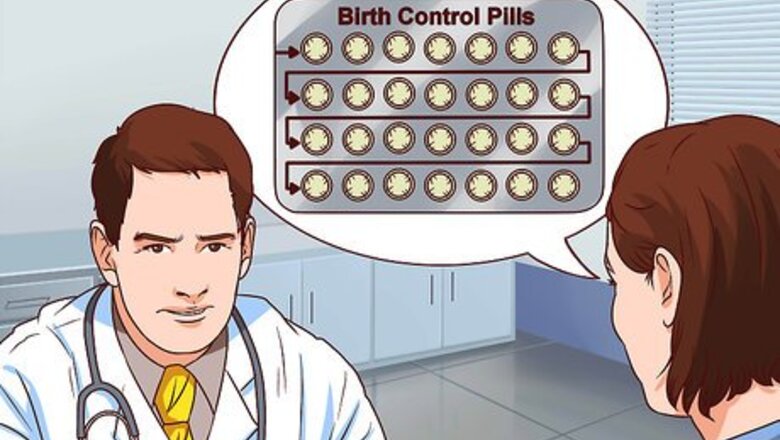
views
X
Trustworthy Source
MedlinePlus
Collection of medical information sourced from the US National Library of Medicine
Go to source
To treat abnormal uterine bleeding, there are several different treatment options and your doctor can help you to choose the best one for you.
Seeking Medical Treatment
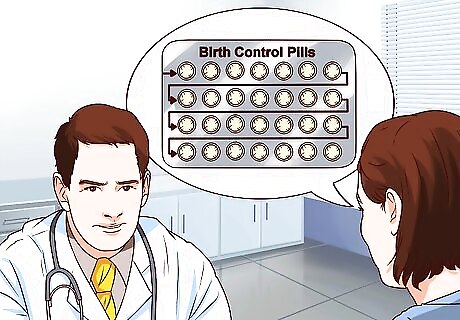
See a doctor as soon as possible. If you are having abnormal uterine bleeding, then see your physician as soon as possible. Abnormal vaginal bleeding can be the result of many different conditions ranging from not serious to life threatening. Some possible reasons why you may be having abnormal uterine bleeding may include: Celiac disease Certain types of cancer Endometriosis Gonorrhea Hypothyroidism Hyperthyroidism Polycystic ovary syndrome Pregnancy Stopping birth control pills Vaginitis Uterine polyps or fibroids
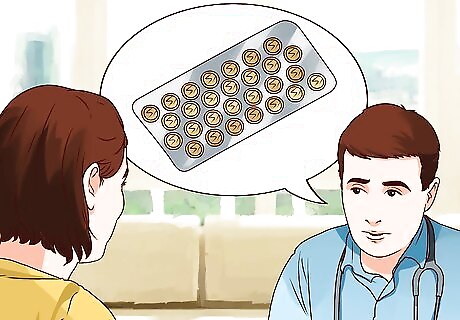
Ask your doctor about a low-dose contraceptive. A common early treatment for abnormal uterine bleeding is a low-dose contraceptive that contains synthetic estrogens and progestins. This medication should help to normalize your menstrual cycle and decrease your menstrual flow. Talk to your doctor about getting a prescription for a low-dose contraceptive if this option appeals to you. Keep in mind that low-dose contraceptives should be taken for a short time unless you want to use the drug to prevent pregnancy as well.
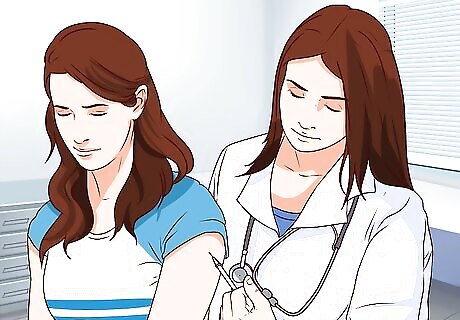
Try a higher dose estrogen therapy for heavy bleeding. If you have abnormal uterine bleeding that is heavy, then higher doses of estrogen may be necessary to normalize your cycle. Keep in mind that there are significant risks associated with these drugs. Do not use these medications if you: Have recently given birth Smoke more than 15 cigarettes per day and you are over 35 years old Have a personal or family history of breast cancer, liver disease, blood clots, migraines, high blood pressure, gallbladder disease, heart disease, diabetes, or high triglyceride blood levels.
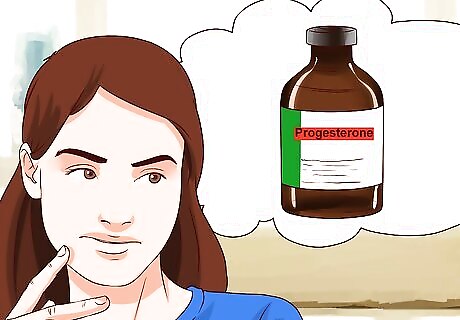
Look into progesterone-only treatments. Progesterone (or a synthetic progestin) may be used on its own in women who cannot or do not want to take estrogens. Progesterone may also be used if a previous treatment using oral contraceptives did not help to control the bleeding or if lab tests show that progesterone levels are low. Progesterone may be given in the form of a pill, an IUD intrauterine device) or as an injection. Keep in mind that progesterone alone will not prevent pregnancy. If you want to prevent pregnancy, then you will need to take another contraceptive as well.

Try tranexamic acid. This treatment, prescribed by your doctor, is neither a contraceptive nor a hormone. Tranexamic acid tablets are taken when heavy bleeding begins and will help the blood in your womb to clot, potentially reducing blood loss by 29 – 58%. You may wish to use tranexamic acid in combination with a non-steroidal anti-inflammatory drug (NSAID).

Consider male androgen if other treatments are not successful. In some rare cases where bleeding does not respond to any other treatment, your doctor may recommend a male androgen called Danazol to control abnormal uterine bleeding. Danazol should not be used if you are pregnant or breast feeding and this drug will not prevent pregnancy either. There are also some serious risks associated with this drug, including: Stroke Liver disease Increased pressure in the brain
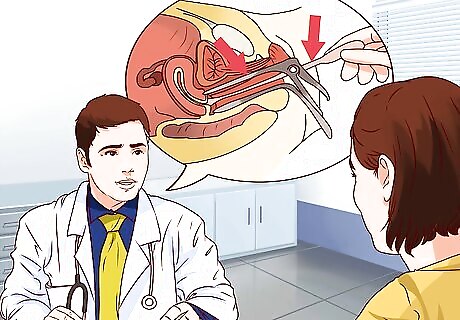
Ask about dilation and curettage. Dilation and curettage has been successful at temporarily halting abnormal bleeding for some women. During this procedure, your cervix is dilated so that the doctor can scrape out excess tissue from your uterus. The tissue may also need to be analyzed to determine if it is abnormal in any way. This procedure is not a permanent fix. It can help provide the diagnosis and temporarily stop the bleeding, but it will not address the underlying cause of the abnormal bleeding. This procedure is performed under anesthesia so you will not feel it or be aware of what is happening.
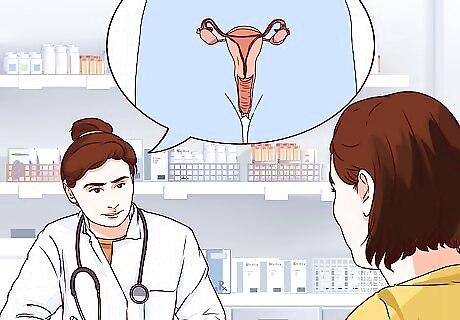
Discuss surgical options. In some rare cases, the only way to stop abnormal uterine bleeding is by surgical means. There are two options that are common for this condition. Endometrial ablation. Endometrial ablation is a procedure that destroys the lining of the uterus, but does not remove the uterus itself. This procedure should stop abnormal bleeding, but you may continue to have light periods after the procedure. Most women are not able to get pregnant after the procedure, but birth control is still recommended if you want to be certain that you will not become pregnant. Hysterectomy. In a hysterectomy, the entire uterus is removed. This procedure will make it impossible to have periods or to become pregnant. It will stop abnormal uterine bleeding, but it is a major surgical procedure.
Using Alternative Treatments
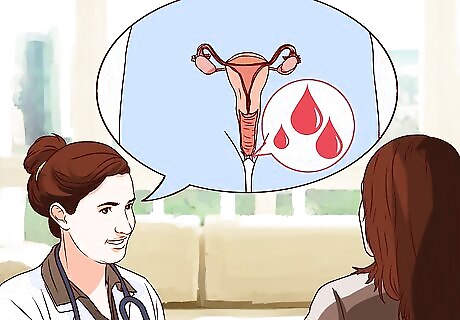
Tell your physician about any alternative therapies you are using. It is important to see your physician about abnormal uterine bleeding no matter what. However, if you wish to try some natural treatments to stop the abnormal bleeding, then make sure that your physician is aware of what you are doing. Keep in mind that even though a medicine is natural, it can still cause side effects and interact with prescription medications. "Natural" does not always mean "safe."
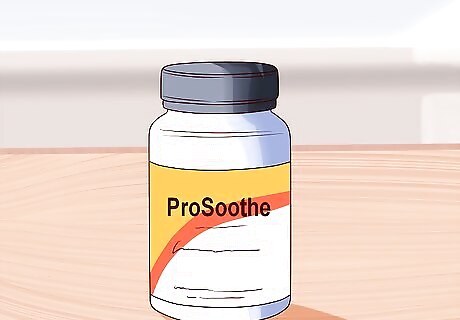
Consider combination herbal products. There are some combination herbal products that may help to stop abnormal uterine bleeding. These products attempt to balance out your hormones, but they have not been proven to be effective. Also, keep in mind that because these products are not as potent as hormones, they may take longer to work. Talk to your physician before you try taking any herbal supplements for abnormal uterine bleeding. Some popular products include: ProSoothe which contains vitamin B6, chaste tree, wild yam, dandelion, bupleurum, and ginger. Slow Flow which contains vitamins A, C, and K1, bioflavonoids, ginger, cranesbill, periwinkle, yarrow, life root and shepherd’s purse. Progensa 20 which is a bio-identical progesterone cream that also contains evening primrose oil, burdock root, chamomile, ginseng, lavender, and grape seed extract.
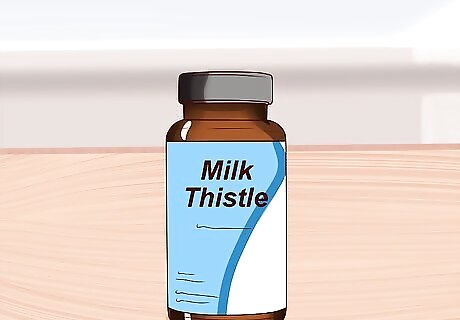
Look into liver support products. Taking a liver support product may also help to stop abnormal vaginal bleeding because the liver metabolizes hormones. By supporting your liver, you may be able to achieve hormonal balance naturally and stop the abnormal bleeding. Milk thistle and dandelion root may help to support the liver. Milk thistle. You can take milk thistle as a capsule, but you should ask your doctor first. Make sure that you follow the manufacturer’s instructions for use as well. Dandelion root. You can also drink roasted dandelion root tea to support the liver. Make sure that you check with your doctor first.

Drink ginger tea. Ginger tea may help to increase anti-inflammatory prostaglandins, which may lead to a reduction in abnormal uterine bleeding. Try drinking a commercial ginger tea or mince one teaspoon of fresh ginger and steep it in boiled water for about 10 minutes. Drink three to four cups of ginger tea per day. You can also add honey and/or lemon as needed. Do not exceed more than four grams of ginger per day, including food sources.

Increase your iron intake. Getting enough iron in your diet will not treat abnormal uterine bleeding, but it may help to prevent anemia from blood loss. Eat two servings of iron-rich foods per day such as: Red meats Beans Dark leafy green vegetables (spinach, chard, mustard greens, and broccoli) Raisins
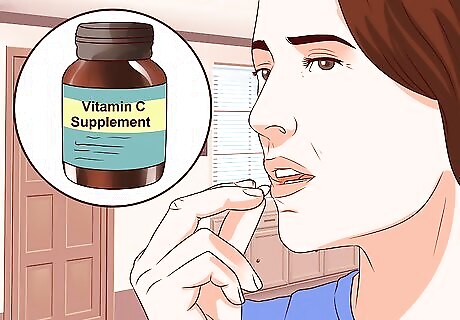
Take a vitamin C supplement. Getting enough Vitamin C will not stop abnormal uterine bleeding, but it may help to support your health by keeping your blood vessels strong. Take 250 to 500 mg of vitamin C every day or just eat more vitamin C-rich foods such as: Oranges Grapefruit Strawberries Peppers Cantaloupe
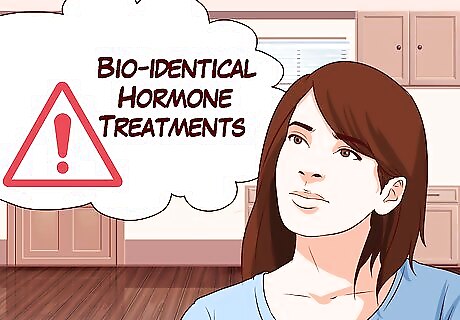
Use bio-identical hormone treatments with extreme caution. Bio-identical hormones are man-made hormones that are supposed to match natural human hormones on a chemical and molecular level. They may be made from either animal hormones that have been altered using chemicals or they may be 100% synthetic hormones. Bio-identical hormones are not as potent as commonly prescribed hormones, but may have fewer side effects. You still need a prescription for bio-identical hormones, so talk to your doctor if you are interested in this option. Bio-identical hormones are not regulated by the FDA. While they may contain FDA-approved ingredients, the final product has not been approved by the FDA. They have not been proven to be safe or effective. Be particularly wary of compounded hormones. Depending on where there are compounded, you may not even be sure how much hormone or what hormone you are receiving.



















Comments
0 comment